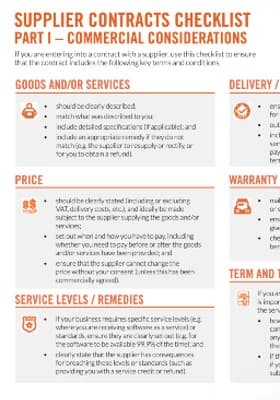Table of Contents
A contract is a vital document to protect both customers and suppliers. However, to fully protect your business, you should always read a contract before signing it. Failing to do so could put your business at risk. This article will explore why you should read a contract before signing it.
Why is a Contract Important?
A contract records the terms under which parties will do business. Written contracts are crucial for both parties, be they customer or supplier.
Why Should You Read a Contract Before Signing It?
Before you sign a contract, it is critical to read and understand it. Every contractual project is unique and will face different legal issues. Therefore, you should review every business contract to ensure it is workable and fit for purpose.
It can be tempting to save time and sign the document you receive, though this comes with significant risk. Here are some of the key reasons why you should read a contract.
Continue reading this article below the formCall 0808 196 8584 for urgent assistance.
Otherwise, complete this form and we will contact you within one business day.
1. To Understand Each Party’s Rights and Obligations
It is crucial that your contract clearly defines each party’s obligations. Ensure you fully understand what you need to do under the contract so you can decide whether you want to proceed to sign it. For example, as a customer, you should carefully check that the supplier’s contract covers exactly what you are requesting and reflects your agreed terms.
The contract terms should be clear to avoid mismatched expectations. If the contract incorrectly documents your negotiated deal, this could lead to misunderstandings and potential disputes later.
2. To Understand the Legal and Commercial Risks
By not reading the contract thoroughly, you will not know what you are signing up for and what risks you are taking under the contract. Contracts will often contain various clauses which could impose certain liabilities and risks.
For example, a contract might state that your business must pay extra charges for late payment or that the supplier has the right to end the contract straightaway if you fail to pay on time. Such clauses may not be ideal, and this is something you will need to negotiate with the other party. By signing the contract without reading it, you are legally stating that you agree to its terms and will comply with them. As you can imagine, this can cause significant problems if you later realise the contract differs from what you expected because you did not read the fine print.
Understanding the risks allows you to discuss them with the other party and reach a compromise. However, if you read a contract and identify severe risks you cannot take, you may decide not to go ahead with the project.
3. To Negotiate Clauses That Best Protect Your Interests
If you read a contract, you may spot certain provisions you are uncomfortable with. You may also want to add clauses to protect your best interests. For example, reading a contract can help you identify and address the following issues:
- including a ‘limitation of liability’ clause – If you are signing a contract issued by another party, the contract may be one-sided and not limit your liability. A limitation of liability clause is crucial for business protection, to reduce your liability in certain circumstances;
- addressing any high-risk, unfavourable clauses – The contract may contain very onerous terms, which could put your business at risk. You may wish to discuss and negotiate such terms with the other party. For example, there may be onerous indemnity clauses that could cost your business a lot of money. You may want to push back on those clauses or seek to limit how much you would need to pay under them;
- requesting bespoke clauses – Reading the contract may reveal that key clauses are missing, which you would like to include to protect your business. Importantly, it is vital your contract is fit for purpose. If the contract is too generic, it may not be suitable and signing it could expose your business to high risk.
If you are unsure what to look for when reading a contract, seeking legal advice from an experienced contracts lawyer can help. For example, a contracts lawyer can help your business understand whether the contract is fit for purpose, what the risks are and what points to negotiate before you sign it.

Download this free Commercial Contracts Checklist to ensure your contracts will meet your business’ needs.
Key Takeaways
A contract is a crucial document to protect your business, whether you are a supplier or a corporate customer. All businesses should read contract terms before signing a contract. Doing so will help you understand your obligations, ensure the contract is suitable, identify risks and allow you to negotiate certain contract terms to protect your best interests.
If you need help reviewing a contract, our experienced contract lawyers can assist as part of our LegalVision membership. For a low monthly fee, you will have unlimited access to lawyers to answer your questions and draft and review your documents. Call us today on 0808 196 8584 or visit our membership page.
We appreciate your feedback – your submission has been successfully received.








